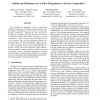ITCC
2005
IEEE
14 years 5 months ago
2005
IEEE
Background: Key management in a mobile ad hoc environment is complicated by frequently partitioning network topology. Recently proposed key management systems (KMSs) provide limit...
ITCC
2005
IEEE
14 years 5 months ago
2005
IEEE
— Ad hoc wireless networks are growing in popularity and usefulness, however they rely on broadcasting as a fundamental process for routing. Improvements to broadcasting have mad...
IEEESCC
2005
IEEE
14 years 5 months ago
2005
IEEE
The paradigm of automated e-service composition through the integration of existing services promises a fast and efficient development of new services in cooperative business env...
ICPPW
2005
IEEE
14 years 5 months ago
2005
IEEE
— In a typical mobile ad hoc network, mobile computing devices wander autonomously and communicate via temporary links in a self-organized computing system without any central ad...
ICNP
2005
IEEE
14 years 5 months ago
2005
IEEE
In this paper we focus on the problems of maintaining Ad Hoc network connectivity in the presence of node mobility whilst providing globally efficient and robust routing. The com...
ICDCSW
2005
IEEE
14 years 5 months ago
2005
IEEE
Due to the utilization of location information, geographic ad hoc routing presents superiority in scalability compared with traditional topology-based routing in mobile ad hoc net...
COLCOM
2005
IEEE
14 years 5 months ago
2005
IEEE
CDMA technology represents an attractive choice for various wireless ad hoc networks applications, due to its appealing properties, such as resistance to jamming and interference,...
MSWIM
2006
ACM
14 years 5 months ago
2006
ACM
In this paper, we define a model of an ad hoc routing protocol, i.e. the OLSR (Optimized Link-State Routing) protocol. This model handles novel constraints related to such networ...
MOBIWAC
2006
ACM
14 years 5 months ago
2006
ACM
Some reactive ad hoc protocols allow the discovery and/or storage of multiple paths to the same destination node. The selection of the path to utilize is commonly based on the cri...
ADHOCNOW
2006
Springer
14 years 5 months ago
2006
Springer
In ad hoc mobile wireless networks, energy consumption is an important issue as most mobile hosts operate on limited battery resources. Existing models for evaluating the energy co...


